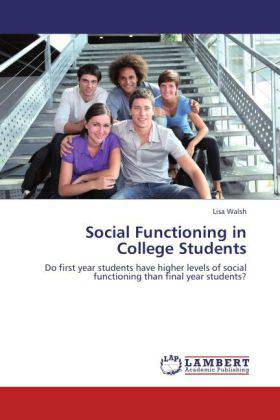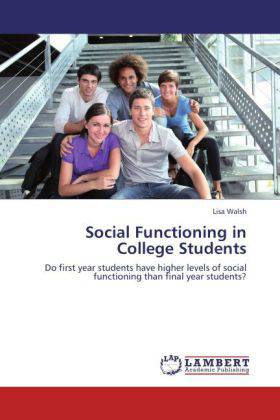
Je cadeautjes zeker op tijd in huis hebben voor de feestdagen? Kom langs in onze winkels en vind het perfecte geschenk!
- Afhalen na 1 uur in een winkel met voorraad
- Gratis thuislevering in België vanaf € 30
- Ruim aanbod met 7 miljoen producten
Je cadeautjes zeker op tijd in huis hebben voor de feestdagen? Kom langs in onze winkels en vind het perfecte geschenk!
- Afhalen na 1 uur in een winkel met voorraad
- Gratis thuislevering in België vanaf € 30
- Ruim aanbod met 7 miljoen producten
Zoeken
Social Functioning in College Students
Do first year students have higher levels of social functioning than final year students?
Lisa Walsh
Paperback | Engels
€ 64,45
+ 128 punten
Omschrijving
This thesis examines the affect the psychological variables of shyness, self-esteem and social self-efficacy have on students levels of social functioning. Social functioning occurs when an individual interacts with other individuals and carries out social role behaviours connected to individual or chosen social positions. Hypotheses that the researcher considered were that shy, low self-esteem, low social self-efficacy individuals have poor social skills and thus low levels of social functioning. Also considered was, that there was a difference between year of study and gender and levels of social functioning. The results supported the hypotheses with the exception that there was no difference between year of study and social functioning levels. Self-esteem and Gender were found to be the most significant predictors of social functioning in college students. Current and past research on the relationship between the psychological variables (shyness, self-esteem and social self-efficacy) showed similar results, but the results relevant to gender differed from past research.
Specificaties
Betrokkenen
- Auteur(s):
- Uitgeverij:
Inhoud
- Aantal bladzijden:
- 76
- Taal:
- Engels
Eigenschappen
- Productcode (EAN):
- 9783848430505
- Verschijningsdatum:
- 27/03/2012
- Uitvoering:
- Paperback
- Afmetingen:
- 152 mm x 229 mm
- Gewicht:
- 122 g

Alleen bij Standaard Boekhandel
+ 128 punten op je klantenkaart van Standaard Boekhandel
Beoordelingen
We publiceren alleen reviews die voldoen aan de voorwaarden voor reviews. Bekijk onze voorwaarden voor reviews.









